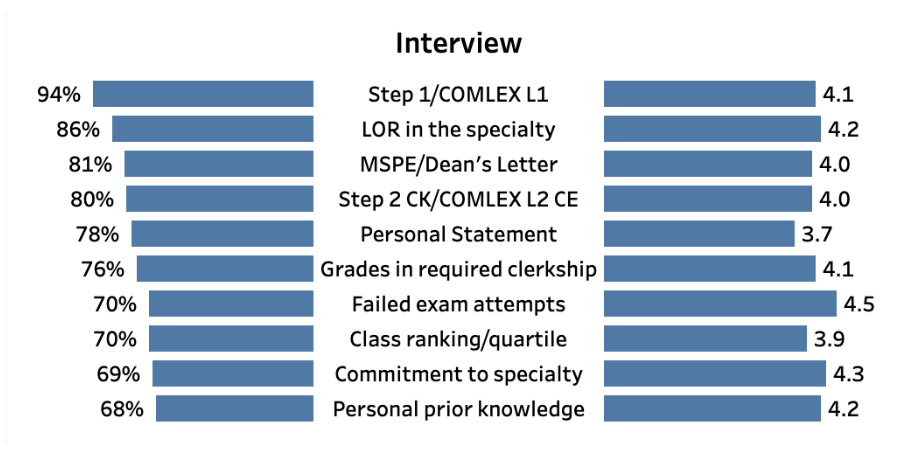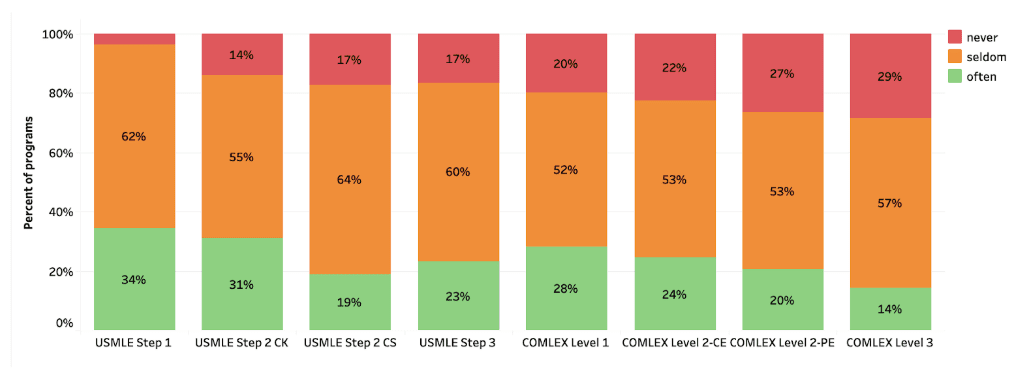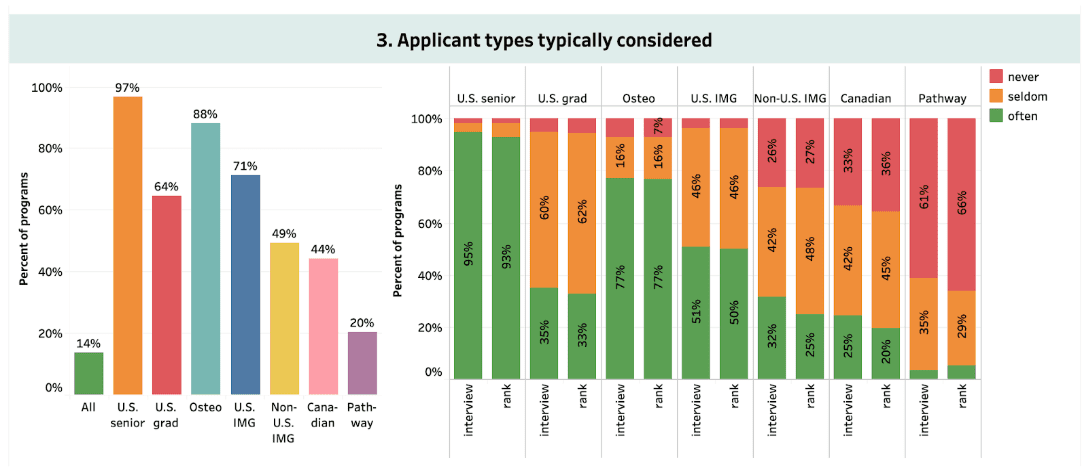What You Need to Match into Psychiatry for Residency

21317 Views
How to Match into a Psychiatry Residency Program
Residency application season is upon us and today we’re looking at what makes a strong psychiatry residency application! The NRMP conducted a survey to determine what factors Program Directors consider when deciding which candidates to interview and rank for their residency program. The results were compiled into a “at a glance” tool, which is extremely helpful in gauging where your application packet stands compared to the applicant pool, and whether adding additional components, like a letter of recommendation (LOR) in the specialty, could give you a leg up as programs review your application.
The interactive tableau tool can be found here, and we recommend taking a look at the specialty you’ll be applying to before submitting your ERAS packet: https://public.tableau.com/profile/national.resident.matching.program#!/vizhome/PDSurvey_0/Desktoptablet
For psychiatry residency, major components of the survey you should pay attention to include: (from top to bottom of the page):
- Selection Criteria for an Interview – LOR in the specialty is a MAJOR factor. It is worth noting that while Step 1/COMLEX scores are listed number 1 according to NRMP, you do not have to have an ultra-competitive score; as long as your score is within the normal range for psych (see below) you should be fine. Unsurprisingly for a field based so strongly around interpersonal interactions, your letters of rec and dean’s letter will also factor heavily into your applications.
-
Step 1 and Step 2 Scores:
- Step 1 – Score
-
-
- 240+ is a very solid score in psychiatry, with the median being 220.
- Range programs do NOT typically offer interviews: 200-220 seems to be the minimum threshold we would recommend for having a good chance at enough interviews. If you’re below 200-220 range, we suggest having a back-up specialty you could consider.
- Range programs DO typically offer interviews: 230+ seems to be the range at which you can feel comfortable in being offered interviews by a decent number of programs. If you’re in the 240+ range, you can likely be selective about where you apply.
-
- Step 2CK – Score
-
-
- 200-220 seems to be the minimum threshold at which programs will grant interviews
- Scores below 200 generally will place you in a unfavorable position to receive an interview
-
- Step 2CK – Timing of Taking the Exam
- Only 26% of programs required at least passing CK, while 53% did require the test at all. For now we recommend timing your CK on a case-by-case basis; in many cases we would recommend taking it before you’ve submitted ERAS, but depending on where you’re applying (especially if you’re looking at the 53% of programs that don’t require a passing score!) you could be perfectly fine waiting until later.
- Failing Step 1 is not likely to be a show stopper:
- Failing Step 1 is a big deal in ANY specialty, but psychiatry is more forgiving of this than most. Only a slim 3% of programs report never interviewing candidates who have failed Step 1. It is important to note, however, that 62% of programs report “seldom” interviewing candidates who have failed the Step. If you’ve failed this exam you should consider applying more broadly than you would otherwise, and make sure the other aspects of your application are as strong as possible (remember that strong LORs count for a lot in this specialty!), but you should not have a problem matching solely because of this.
-
Types of Applicants Considered:
- International Grads (U.S. and non-U.S.) should not have significant trouble matching into psychiatry, but can face barriers: 51% of US programs often interview US IMGs, while 32% often interview non-US IMGs. Only a scant 4% of programs report never interviewing US IMGs, although 26% report never interviewing non-US IMGs. If you are a US international grad this element should not present a significant barrier to you; while you can anticipate it being a challenge for some programs, don’t let it hold you back. If you are a non-US international grad you should look a little more carefully at the programs you’re considering; be sure to look for programs that have one or more active IMGs who you could talk to about their application experience.
- Osteopathic graduates should have no problem matching into psychiatry: Only 7% of programs will never interview DO applicants, and the same percentage never rank them. A tremendous 77% of US neurology programs report both interviewing and ranking DO applicants often. While 16% of programs report “seldom” interviewing and ranking DO applicants, this degree should overall present no significant barrier towards matching in psychiatry.
- Interviewees Get Ranked!: If you get an interview invitation, you are very likely to end up on the rank list if you interview. We recommend ranking at least 8-10 programs, so once you receive 10 interview invitations, you can feel okay with starting to prioritize and cancel as more come in given you are likely to get ranked.
- Expect to receive interview invitations in November: 54% of the interview invitations will be sent out during October, with close to 20% in both September and November.
- Expect to interview in November/December: The majority of psychiatry interviews happen in November and December, with around 30% of interviews in each of these months, but this specialty provides one of the more evenly spread-out seasons. About 20% of interviews occur in October and January, so you should have a wide window for when these can occur. For further discussion on how to prep for your interview, see our blog post on How to Crush your Residency Interview.
After you’ve browsed your specialty, take a look at a few other specialties and note what’s NOT important for psychiatry residency:
- Getting a phenomenal Step 1 score isn’t particularly important in psychiatry, although passing the exam is very helpful
- Strong letters of recommendation and the MSPE/Dean’s letter are both very important for psychiatry
- A background solely dedicated to the specialty is not as important! Psychiatry loves to take all comers, even if they’ve explored many other specialties or walks of life before.
Summary for Psychiatry Residency Applications:
- A solid psychiatry application would include a 220+ on Step 1, 220+ on Step 2, a LOR from 1-3 psychiatrists, and a good MSPE
- Psychiatry is relatively IMG friendly, although if you’re a non-US IMG this may be a moderate barrier. It certainly is possible to match as a non-US IMG if you do your research to identify programs with active IMG residents and establish proper connections.
- Psychiatry is extremely friendly to DO applicants.
- If you’ve failed an exam, you can still apply in psychiatry, but you should apply more broadly than you would otherwise
- Expect Interviews in November-December. Reach out to programs you have high interest in if you haven’t heard from them by mid-November. Once you have about 10 interview invitations, you can consider being a bit more selective about which ones you actually take (but not before).
Good Luck! ☺
Wondering about your chances of matching into other specialties for residency? Check out our analysis of the NRMP directors survey “at a glance” tool for areas including anesthesia, dermatology, family medicine, transitional year, neurology, emergency medicine, and more under the Residency Applications category of our blog! If you need further or specialized assistance understanding which residency specialties you are best suited to apply to, you can contact us or visit our residency advising page to learn more about how Elite Medical Prep residency advising services.
Featured Articles





